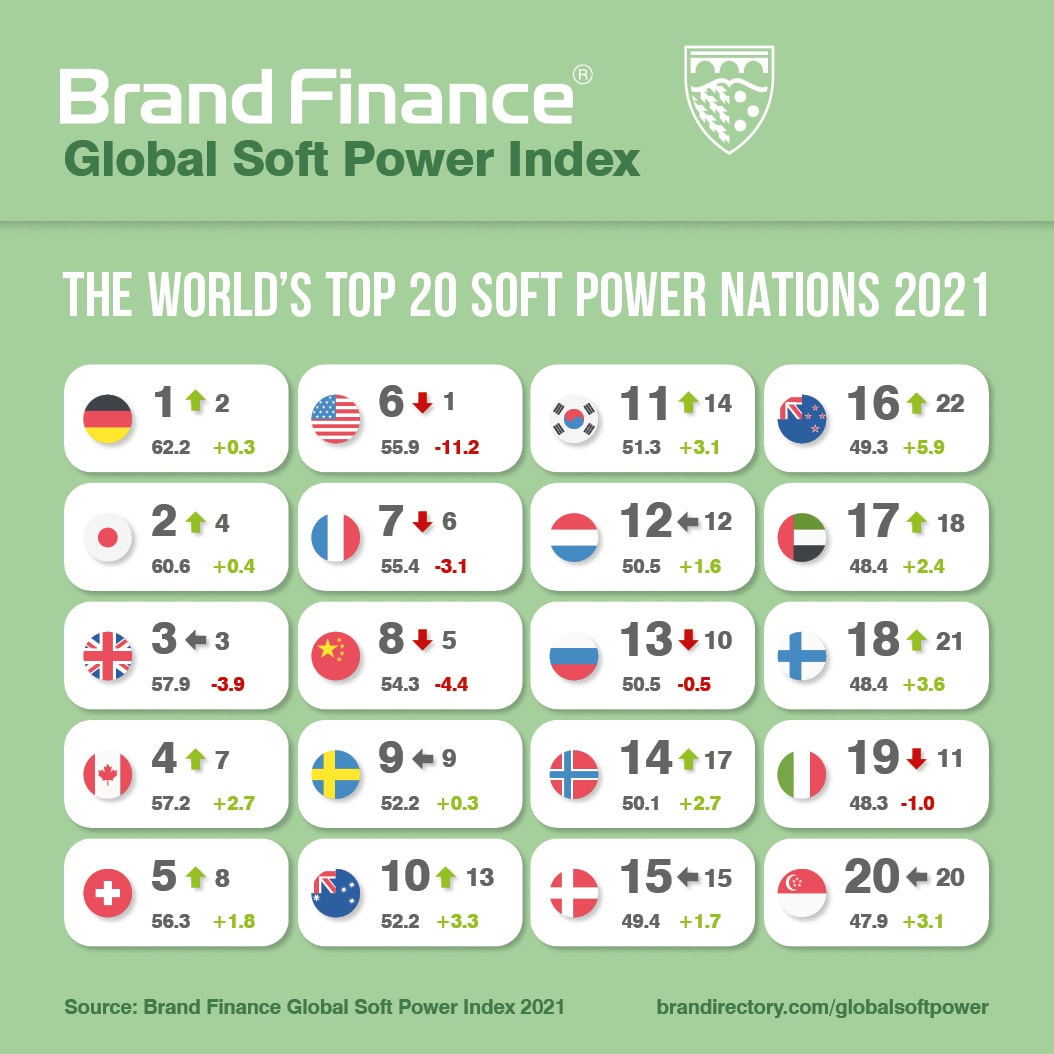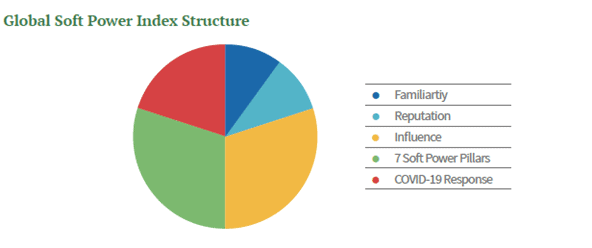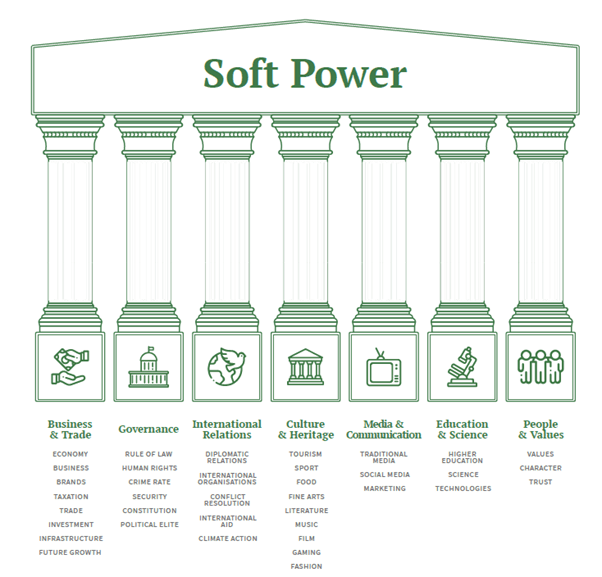A year of widespread turmoil is starkly reflected in America’s steep drop in the Global Soft Power Index 2021, making the US the fastest-falling soft power nation globally. Defined as ability to influence the preferences and behaviors of other nations around the world, soft power is linked to attraction or persuasion, rather than coercion.
Between a turbulent election campaign and a haphazard COVID-19 response, the US lost its position as the world’s soft power superpower, falling from last year’s 1st to 6th position in 2021. With an overall Index score of 55.9 out of 100, down by -11.2 points on last year’s 67.1 – the US recorded a more significant decline than any other nation in the ranking.
With former President Donald Trump’s hesitance to acknowledge the scale and severity of the pandemic criticized at home and abroad, the US places at the very bottom of the Index’s COVID-19 metric, ranking at an abysmal 105th place among all nations rated in the study.
David Haigh, CEO of Brand Finance, commented:
“The raging of the virus across the US combined with President Trump’s rebuke of medical expertise and touting of reckless home-remedies is the most likely culprit for the waning of America’s long-held role model status internationally, at a time where sensible global leadership has arguably been most needed.”

Unveiled at the virtual Global Soft Power Summit 2021, hosted by leading brand valuation consultancy Brand Finance in partnership with BBC Global News, the Global Soft Power Index 2021 represents the most comprehensive research study on perceptions of nation brands – capturing the opinions of 75,000 respondents across 100 countries.
Playing host to various speakers, the Summit also included inputs from David Miliband, CEO and President of the International Rescue Committee, as well as Joseph Nye – the Harvard University Professor originally responsible for coining the phrase ‘soft power’.
According to Professor Nye, the demise of US soft power began as early as 2017 under the Trump administration, but there is hope for recovery:
“Trump’s narrow view of international allies, withdrawal from global agreements like the Paris Climate Accord, and lack of support for the WHO were already damaging American soft power before COVID-19 even hit.
Trump was the first president that did not place a high emphasis on values. When America emphasized values, it made the nation more attractive to society, hence our soft power was unrivalled.
The question is if we can recover our soft power, and I think the answer is yes. If America continues making progress on vaccines and can get the pandemic under control, coupled with a sharp economic recovery, then our prospects look good. So, if I were to comment on what the Global Soft Power Index will say next year, I believe the US will be back on an upward trend.”
David Miliband, in turn, warned of the challenges ahead and underlined the importance of integrity and internal unity for soft power:
“There are more power centers today than ever before, and this increased competition for soft power means reproducing past results is going to be much tougher. In this regard, I think the US is going to have to work a lot harder to re-establish its reputation in the next four years.
If a nation is divided, it becomes harder to attract others, and soft power will suffer as a result. Every government lives in coalition with its own people, regardless of the type of rule in place, and the greatest threat to the soft power of a country is dissonance between what it says it stands for and what its actions reveal it to stand for.”
Note to Editors
Soft power is defined as a nation’s ability to influence the preferences and behaviours of various actors in the international arena (states, corporations, communities, publics etc.) through attraction or persuasion rather than coercion.
Full ranking, methodology, charts, commentary, expert contributions, and in-depth spotlights with interviews on many countries are available in the Global Soft Power Index report.
Data and materials prepared for Brand Finance’s reports and events are provided for the benefit of the media and are not to be used for any commercial or technical purpose without written permission from Brand Finance.
Follow Brand Finance on Twitter @BrandFinance, LinkedIn, Instagram, and Facebook.
About Brand Finance
Brand Finance is the world’s leading brand valuation consultancy. Bridging the gap between marketing and finance, Brand Finance evaluates the strength of brands and quantifies their financial value to help organisations of all kinds make strategic decisions.
Headquartered in London, Brand Finance has offices in over 25 countries, offering services on all continents. Every year, Brand Finance conducts more than 5,000 brand valuations, supported by original market research, and publishes over 100 reports which rank brands across all sectors and countries.
Brand Finance is a regulated accountancy firm, leading the standardisation of the brand valuation industry. Brand Finance was the first to be certified by independent auditors as compliant with both ISO 10668 and ISO 20671, and has received the official endorsement of the Marketing Accountability Standards Board (MASB) in the United States.
About the Global Soft Power Index by Brand Finance
For over 15 years, Brand Finance has been publishing the annual Nation Brands report – a study into the world’s 100 most valuable and strongest nation brands. Focusing on the financial value and strength of nation brands, the Brand Finance Nation Brands study is based on publicly available information, including data compiled by third parties for other indices and rankings.
Building on this experience, Brand Finance has now produced the Global Soft Power Index – the world’s most comprehensive research study on perceptions of 100 nation brands from around the world. The Global Soft Power Index is based on the most wide-ranging fieldwork of its kind, surveying the general public as well as specialist audiences, with responses gathered from over 100,000 people from across the world. The Global Soft Power Index report is the annual iteration of this study.

Global Soft Power Index Methodology
Two surveys are conducted, both global in scope:
The Global Soft Power Index incorporates a broad range of measures, which in combination provide a balanced and holistic assessment of nations’ presence, reputation, and impact on the world stage.
The Index gives a 90% weighting to the views of the General Public and 10% to those of Specialist Audiences
